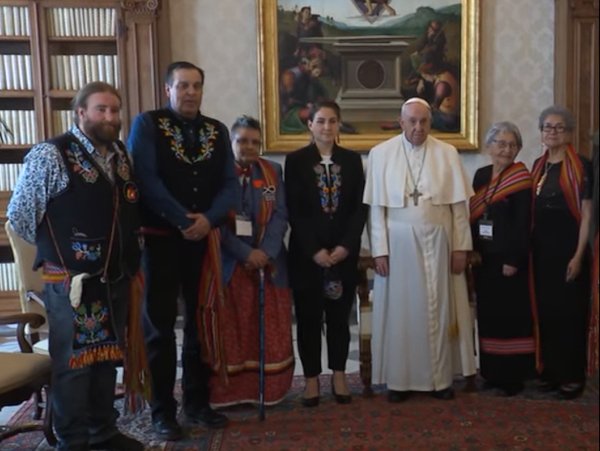Last April 1 Pope Francis committed to come to Canada when he addressed Canadian indigenous representatives at the Vatican. “You have brought here, to Rome, a living sense of your communities. I will be happy to benefit again from meeting you when I visit your native lands, where your families live. I won’t come in the winter! So I will close by saying “Until we meet again” in Canada, where I will be able to express to you my closeness better. In the meantime, I assure you of my prayers, and upon you, your families and your communities I invoke the blessing of the Creator.”(1) He will visit Alberta, Quebec and Nunavut from July 24 to 29, 2022.
“The Pope’s visit will provide a unique opportunity for him, once again, to listen and dialogue with Indigenous Peoples, to express his heartfelt closeness and to address the impact of colonization and the participation of the Catholic Church in the operation of residential schools throughout Canada. The papal visit will also provide an opportunity for the shepherd of the world’s 1.2 billion Catholics to connect with the Catholic community in Canada.” (papalvisit.ca)
We offer in this post some resources to better be able to follow the Pope’s visit to Canada, to help us reflect, pray and prepare to welcome him for these special days among us. Since the theme of his visit is Walking Together for reconciliation, we provide as well as some materials to reflect on reconciliation and forgiveness.
Links to various resources
- Healing and Reconciliation, An Historic Journey: https://www.papalvisit.ca/
- Schedule of his visit: https://www.papalvisit.ca/schedule/
- News and updates: https://www.papalvisit.ca/news/
- Links to the Canadian Conference of Catholic Bishops website and to other educational and supportive resources: https://www.papalvisit.ca/healing-and-reconciliation/
Pope Francis on forgiveness and reconciliation
Forgiving does not mean forgetting. Or better, in the face of a reality that can in no way be denied, relativized or concealed, forgiveness is still possible. In the face of an action that can never be tolerated, justified or excused, we can still forgive. In the face of something that cannot be forgotten for any reason, we can still forgive. Free and heartfelt forgiveness is something noble, a reflection of God’s own infinite ability to forgive. If forgiveness is gratuitous, then it can be shown even to someone who resists repentance and is unable to beg pardon. Those who truly forgive do not forget. Instead, they choose not to yield to the same destructive force that caused them so much suffering. They break the vicious circle; they halt the advance of the forces of destruction.(2)
St. Josemaría on forgiveness and reconciliation
Without ceasing to be a mother, our Lady is able to get each of her children to face his own responsibilities. Mary always does the immense favour of bringing to the cross, of placing face to face with the example of the Son of God, those who come close to her and contemplate her life. It is in this confrontation that christian life is decided. And here Mary intercedes for us so that our behaviour may lead to a reconciliation of the younger brother — you and me — with the firstborn Son of the Father.(3)
Some aspects of St. Josemaría’s teachings on forgiveness and their relevance in fostering a peaceful co-existence: https://opusdei.org/en/article/st-josemaria-teacher-of-forgiveness-part-1/
https://opusdei.org/en/article/st-josemaria-a-teacher-of-forgiveness-part-2/
Novena to pray for forgiveness: https://opusdei.org/en/article/novena-for-forgiveness/

- Address, Meeting with representatives of indigenous peoples in Canada, Clementine Hall, 1 April 2022.
- Fratelli Tutti, nos 250-251. Pope Francis, 2020.
- Christ Is Passing By, no 149.
